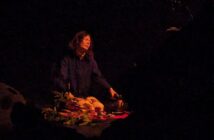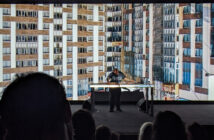The 18th edition of the annual Jazz-Espa open air summer festival coincides with the 100th year of Finnish Independence, and showcases both new and established Finnish jazz presented in two daily one hour concerts over two weeks. Run by Jazz Finland, it presents an opportunity to sample what is happening in Finnish (and some Nordic) jazz, in usually sunny weather, at a leisurely pace. Although I missed the first couple of days, I managed to catch the rest, including an ‘Afterparty’ on 5th August featuring Jimi Tenor and the Afrojazz Quartet and the We Jazz DJs, a regular institution in Helsinki. Although there’s quite a variety of performers, it’s also surprising how many musicians keep recurring in different groups and contexts, forming a prolific bunch of musicians active in various formations – rather like the jazz scenes in most Australian cities.
The first group I caught was GI/AN/T, an amalgamation of the first letters of the first names of the three members – Gine Gaustad Anderssen a female vocalist from Norway, Anti Kujanpää, a leading young Finnish pianist and composer on organ, and Tuomas Timonen, a pop, rock and folk musician who leads the Tuomas Timonen Lifetime, and teaches at the Sibelius-Academy Jazz Department, on drums. Anderssen sang a couple of tracks of her 2016 album Heim, featuring Swedish trumpeter Arve Henriksen, and including the rather soppy ‘I Believe in Beauty’. She has also collaborated, mostly in English, with the Esthonian group Dessert Time, but some of her songs here were in Norwegian, which she declaimed from a book of poetry by a monk from the Fjords. The most noticeable aspect of her singing, physical style and mannerisms were their similarity to Björk, although without the costumes and props, in a very scaled-down fashion. Kujanpää ad Timnen provided imaginative accompaniment, which raised the level somewhat, but the derivative nature of the singing kept things pretty earthbound.
They were followed by the ingeniously named group Equally Stupid, an improvising trio consisting of Icelandic guitarist Sigurdur Rögnavaldsson, who also leads a group in Finland called Dark Forest, who have played here previously, Pauli Lyytinen, composer, saxophonist and conductor of special effects and synthesiser, a member of the ingenious experimental pop-jazz group Elifantree, active since 2007, and named by Stuart Nicholson in The ire as gig of the year in 2009, as well as numerous other projects, as well as sometime collaborator with Jimi Tenor, and prolific Swiss drummer David Meier, a member of UK-based Trio Riot, as well as Swiss-based Things to Sounds, and David Meier’s Hunter Gatherer, and involved in numerous other projects. Equally Stupid is a riot, and earn an encore, taking improvised jazz to a new, explosive level, and pleasing the crowd in the process with their intelligent, good natured synthesis, with song titles such as ‘Politicians’ Nightmare’, ‘Birdlife’ and ‘Paranoia’. Their most recent album, Escape from the Unhappy Society, featuring Lyytinen on bass sax, and Rögnavaldsson on baritone guitar, was released on Finnish label Eclipse Music in January 2017, and is worth seeking out. Their slogan goes: ‘All are equal. Some are more equal than others. But only very few are equally stupid. An absolute highlight.
The slightly less–eccentric Helsinki-based Bowman Trio https://soundcloud.com/johanbowman-trio, consisting of Joonas Tuumi on bass, Sami Nummela on drums and trumpeter Tomi Nikku, are a rather more sober affair, but come with the label of We Jazz Rising Stars of 2015 and released their first album on the We Jazz label. Their name comes from the story of Johan Bowman, a Swede who emigrated to the West Coast of the USA in the 1950s, conquered Mount Everest, escaped from Erwin Rommel in the Sahara and worked for the CIA, and their songs tend to reflect this.
Soul What? featuring the award-winning and much storied saxophonist Joonatan Rautio, are led by female bass player Eevalotta Matikainen, and come from Ostrobothnia in Western Finland, which has a Swedish-speaking majority, and is mostly a post-glacial former seabed. People from there are called ‘Pampees’ due to the similarity of the terrain to Pampas. That aside, the band features a vocalist in English) and Wurlitzer organist, Mikael Svarvar, who really rips it up, along with a feisty guitarist, Martin Söderbacka, and formidable drummer, Toni Porthén, who specialises in powerful drum solos. The band released the second album ‘What Lies Ahead?’ last year.
Inga Söder was born in Rovaniemi in Lapland, where 2007 Eurovision Song winners, heavy metal monsters Lordi also hail from, and is classified as ‘easy listening’ on Wikipedia, a classification which is not wrong, judging from her debut album Stream Carries. She sings in English in a cabaret style which is not to my liking, and seems out of place in this line-up. Not so Njet Njet 9, a nine-tet run by keyboard player Ville Kyttälä, another Sibelius Academy alumnus, and featuring the wonderful flautist and baritone saxophonist Linda Fredriksson, who is active in a number of groups, including the brilliant Mopo, who I’ve written about before. Njet Njet 9 is a lively, light-hearted, brass-dominated outfit, influenced by Zappa and Joe Zaiwinul, whose debut album Unicorn Attack is good fun and imaginative, sophisticated jazz, and features a brilliant spoken word-vocal turn by Stina Koistiven.
Riitta Paakki is a well-established Finnish pianist with a straight ahead but elegant style, who normally plays with a trio, but today adds equally-established saxophonist Manuel Dunkel, who also fronts a quartet called the Platypus Ensemble with German keyboard player Sid Hille. Paaki’s most recent album Characters consisted of piano arrangements of tracks by Wayne Shorter, but here she mixes it up a bit. Drummer Joonas Riippa, who has played with ace trumpeter Verneri Pohjola, and one of Finland’s hardest working bassists Antti Lotjonen, are also part of Paaki’s trio.
Saxophonist Pauli Lyttinen of Equally Stupid makes a return with his Magnetia Orkestri, a free improvising quartet which includes Verneri Pohjola on trumpet, whose latest release Pekka, on the UK label Edition, is dedicated to the compositions of his late father, a prog rock bassist and multi-instrumentalist who was a member of Wigwam before going solo. The album Pekka is being featured at the Flow Festival in Helsinki next week. The free jazz on display here, with drummer Mika Kallio, a regular member of Pohjola’s group as well as many others, and bassist Eero Tikkanen, a member of Mopo and numerous other groups, is quite a stretch for some of the audience but it’s played with authority, flair and good humour.
Buba Wii Aa is a trio of organ, bass and drums, featuring organist Mikael Myrskog, also a member of the Northern Governors, a ‘supergroup’ featuring Linda Fredricksson, and numerous other groups, and are influenced by 1960s San Francisco beach jazz. Their first album is imminent, and their style wears a bit thin after a while, but is retro fun.
Foreign Friends were another highlight, featuring flaming red-haired Turkish-Swedish vocalist and cellist Anni Elif Egecioglu of the cult band Elifantree, Icelandic guitarist Sigurdur Rognvaldsson, German keyboard and theremin player Sid Hille, also a founder member of the Playpus Ensemble, and Ethiopian drummer Abdissa “Mamba” Assefa. They featured a number of well-known Finnish songs, starting with chart-topping pop-rock band Haloo Helsinki’s platinum single ‘The Other Side of the World’ (‘Maailman toisella puolen’ in Finnish, originally sung by the band’s female vocalist Elli Haloo) which Egecioglu sang mostly through a small loudhailer. She also sang Lordi’s ‘Hard Rock Hallelujah’, which won the 2006 Eurovision song contest, and in 2008 broke a world record for karaoke songs, when about 80,000 people sang it on Helsinki’s Market Square. It was performed here complete with a theremin solo, and the group played a number of other Finnish songs, concluding with an ode to summer which has been included in the church liturgy. Unfortunately the weather did not behave accordingly, although it didn’t rain. The quartet also featured a Finnish tango song called ‘Jealousy’, as featured in an Aki Kaurismaki film, and one of Sibelius’ songs. Definitely another highlight.
Plastic Island is a trio featuring renowned Finnish pianist Aki Rissanen, who has played with Dave Liebman and Verneri Pohjola, to name but two, and whose recent album Aleatoric was released on Edition Records, along with another red-haired vocalist, Joanna Sulkunen, an award-winning Finnish singer based in Copenhagen, and drummer Jonatan Leppänen. Sulkunen suffered from inevitable comparisons with the flamboyant Egecioglu, but the trio managed to evolve their own particular song-based style, especially with Rissanen’s expertise. They were followed by AR Quartet, based on the initials of Artturi Rönkä, a gifted young pianist awarded Artist of the Year at the Pori Jazz Festival in 2013, and whose quartet was named We Jazz Rising Stars in the same year. Their debut album came out the following year, and it has been categorised as ‘chamber jazz’, featuring saxophonist Sampo Kasurinen. Pleasant enough music, but slightly on the bland side.
Saxophonist Max Zenger had already featured earlier in the fortnight, accompanying young female pianist Adele Sauros and her trio, and now he was back with the Remel/Zenger/Heinola trio, playing standards, rather uninspiringly, to my ears, and again with his own group, Maxxxtet, playing his own compositions, rather more interestingly, to my mind, with the assistance of trumpeter Tomi Nikku and some more dynamic interplay.
In the interim, guitarist Tuomas Paukku and his quartet Scription, a follow-up to his previous group Description, again featuring pianist Artturi Rönkä, described in the program as ‘the sharpened edge of Finland’s rising jazz generation … with an irrepressible passion’. A little too cautiously, to my mind.
All I caught of the Afterparty (Jatkot in Finnish), was the Afrojazz Quintet, a mix of Finnish guitarists, a trumpeter and a drummer with Meissa Niang, a powerful Senegalese griot singer in the vein of Salif Keita, currently based in Helsinki, and a blind congo player, who warmed things up considerably with dancing and clapping in the cramped and crowded space of the Kappeli Restaurant adjacent to the Espa stage, awaiting the star appearance of ‘spacejazz hipster’ Jimi Tenor on keyboards and sax, still a superstar in his native Helsinki. Every summer I learn a bit more about the fascinating world of Finnish jazz.




